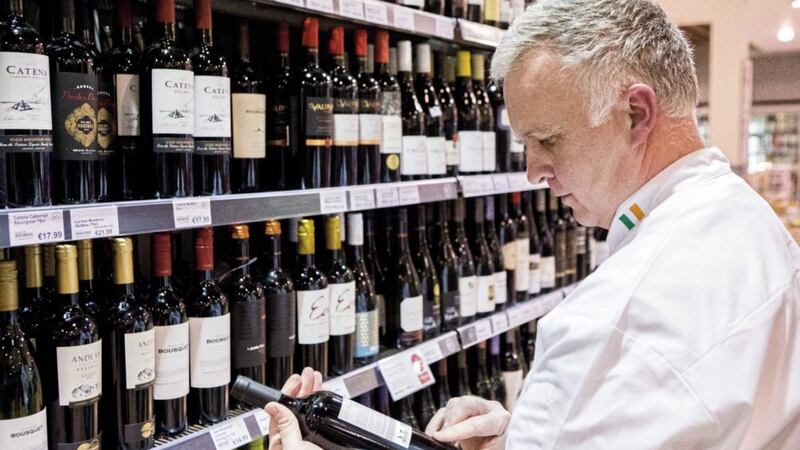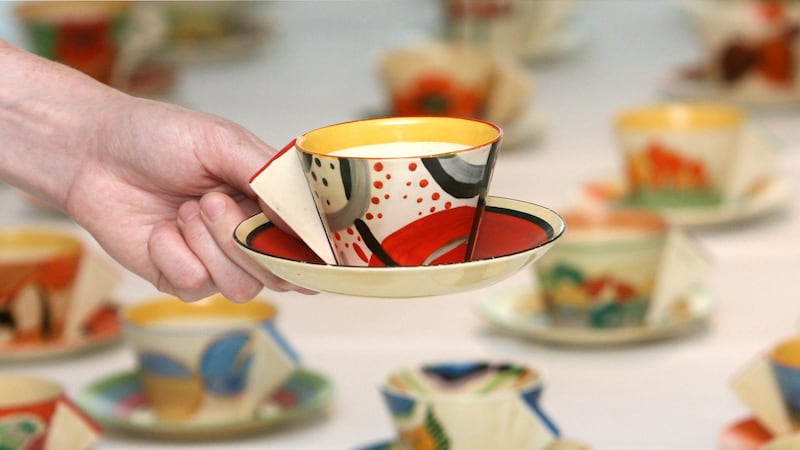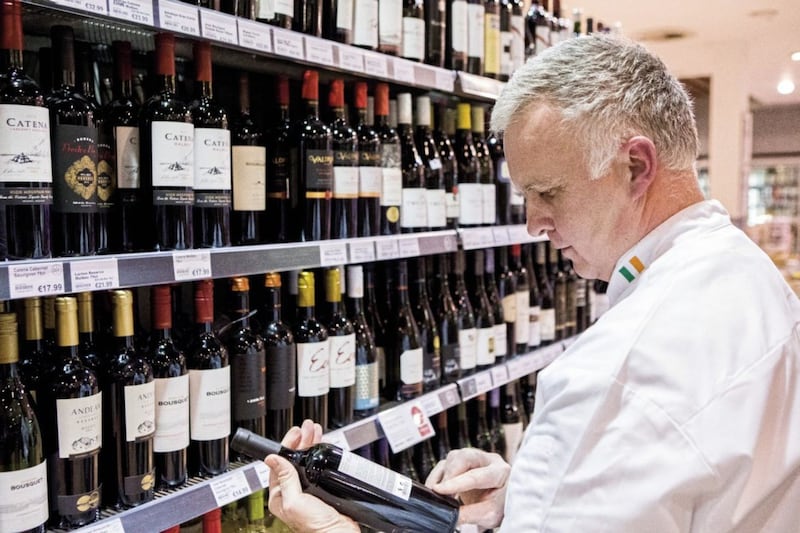FROM car salesman to world traveller to pastry chef, cookery school tutor and now author, Niall Murphy admits he was something of a late starter when figuring out what to do with his life.
At one point, in desperation after leaving the motor industry where he had worked for 27 years until the recession brought it screeching to a halt, he consulted a career coach. Unfortunately, his professional mentor had also run out of ideas, so the out-of-work Dubliner went home and flicked through his vast collection of cookery books, trying to cheer himself up by choosing another experimental dish to try out on family and friends.
It proved a pivotal moment for the now executive chef of the Cookery School at Dublin gourmet food-store chain Donnybrook Fair.
"I always loved cooking, like every amateur cook, but I suddenly had that light-bulb moment that people talk about when I thought, maybe, just maybe, I could retrain and do this thing professionally," says the chef, tutor and general manager of the cookery school which officially launched his – and its – debut cookery book last month.
"It was the start of a long road back to school, but everything fell into place and now I'm teaching others how to to go back to basics in the kitchen. The whole vision of the school is rooted in the desire to get people cooking properly in their own kitchens again, making great dishes as simply as possible. The book is a reflection of that."
Niall is adamant that "there are no smoke and mirrors" in what he does, as he tries to convey in the book.
"One of the key skills is just taking time to weigh and measure the quantities correctly," he advises. "And, although my formal training is in classical French cookery, I wanted to include Irish dishes – we have some excellent seafood – as well as influences from my travels around world.
"You will find everything from Vietnamese Pork Balls to Portugeuse Custard Tarts – although, no matter how hard I tried, no Portuguese bakery would divulge the secret to making these tarts, so I had to create my own."
A key ingredient in perfecting any dish, he says, is also a recognition of your own limits as a cook – Murphy has lost track of the number of times he has "knocked on doors" as a dinner guest and ended up being "hauled into the kitchen" to reconstruct some disaster with a panna cotta that didn't set, or similar-type culinary meltdown.
"That's what I love about the new book; it takes the mystery out of cooking," says the 52-year-old. "Why get stressed out? The social aspect of dining is part of the experience; it is just backed up by good food."
Serendipity, as well as hard work, has played its part in the Murphy turnaround, bringing him from schoolboy car salesman to a general manager position with a leading motor company in Dublin, to his current "dream job" where he passes on his skills to all manner of amateur cooks, from children, to the growing number of men who attend the popular 'male only' classes.
With reference to the latter, he recalls a "bizarre" conversation with a recent female caller who wanted to enquire if the male group was a type of 'speed dating' set-up.
"She was really serious, but, sadly, I had to say, 'no', it was in fact, just a class for men who want to learn to cook," Murphy chuckles.
After quitting the motor trade, he travelled around Europe and Asia for six months, before embarking on a "practical, hands-on", Failte Ireland course in Dublin, which involved "cooking live" in a professional kitchen for all its staff.
That pressure cooker experience gave "a good feel for what was involved" and must have made an impression because, after completing the four-month programme, he was asked to stay on for a summer cooking camp for children from inner city areas of Dublin, followed by a nine-month placement at the Leuven Institute for Ireland in Belguim.
"The head chef I was working with in Belgium was a fantastic mentor and told me I needed formal training and to go back to college in Ireland," he says. "I was definitely on the mature side of student, but that is what I did."
Fate intervened again when Murphy had a chance meeting with Joe Doyle, MD of food chain Donnybrook Fair, who was looking for someone who combined business nous with a passion for food to head up his Cookery School venture, and later, when a bread-making student – who happened to work for Mercier Press – suggested he should compile his recipes into a book.
"It was all very random, but here I am, proof that you find your path and it's never too late," Murphy adds. "It took a while, but I think, at last, I have come full circle."
:: The Cookery School by Niall Murphy is published by Mercier Press, priced €22.99, and is available online and in book stores. Below are two recipes from the book for you to try at home.
PAN-FRIEND PRAWNS WITH MOJO VERDE
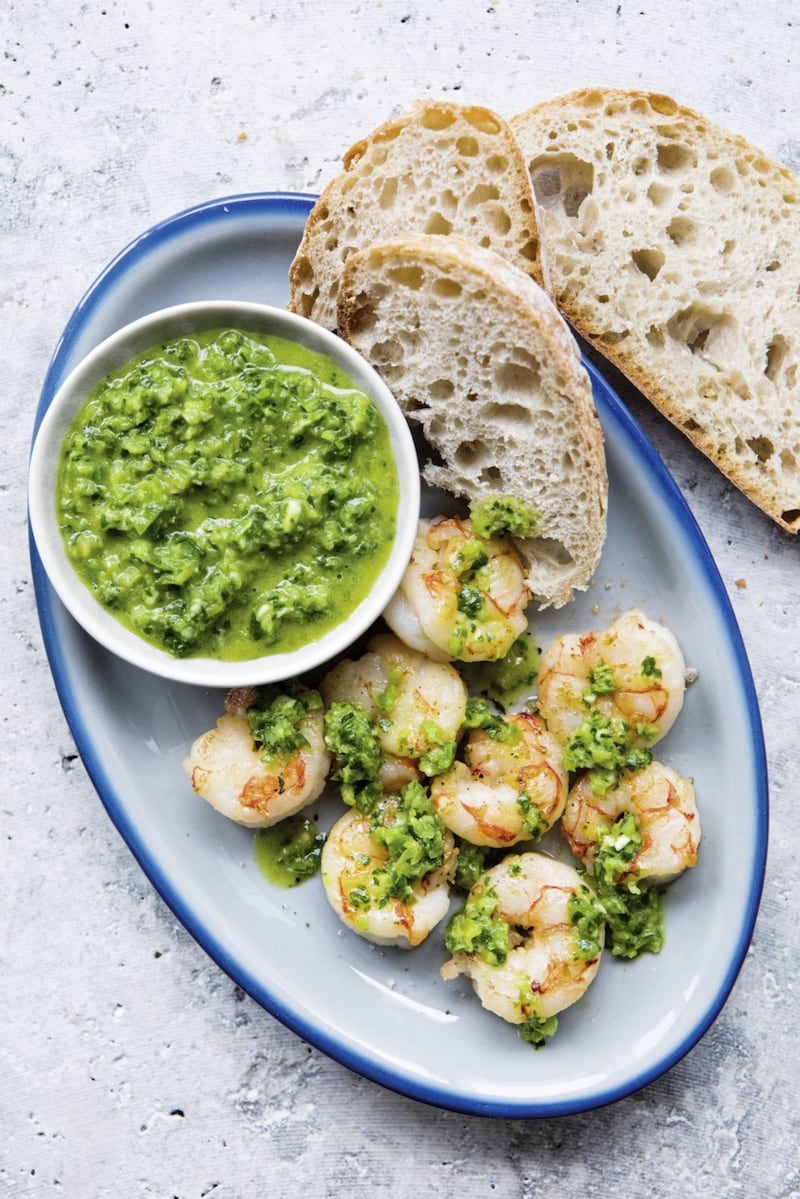
(Serves 4-6)
I recommend that you buy the gambas in their shells for this dish, as the quality is far superior. You need to do a little surgery to remove the heads, shells and digestive tracts, but it’s a job worth doing. Alternatively, you can ask your fishmonger to do this for you.
1 garlic clove, grated
2 tbsp olive oil
Pinch paprika
Salt and freshly ground black pepper
12 gambas, shelled and deveined
For the mojo verde:
1 garlic clove, grated
Handful fresh coriander
Handful fresh flat-leaf parsley
Small green pepper, deseeded and cut into bite-sized pieces
100ml olive oil
2 tbsp red wine vinegar
Place the garlic, olive oil, paprika and some salt and pepper in a bowl and combine, then toss in the gambas and chill until required. Place a pan on a high heat and add the prawns and all the contents from the bowl. Fry, stirring regularly for 2–3 minutes until the prawns are cooked through.
To make the mojo verde, place the garlic, coriander and parsley in a food processor and blitz. Add pepper, oil and vinegar and blitz again. Season to taste and chill until required.
Serve on a platter with a bowl of the mojo verde on the side.
MINI CRAB CAKES
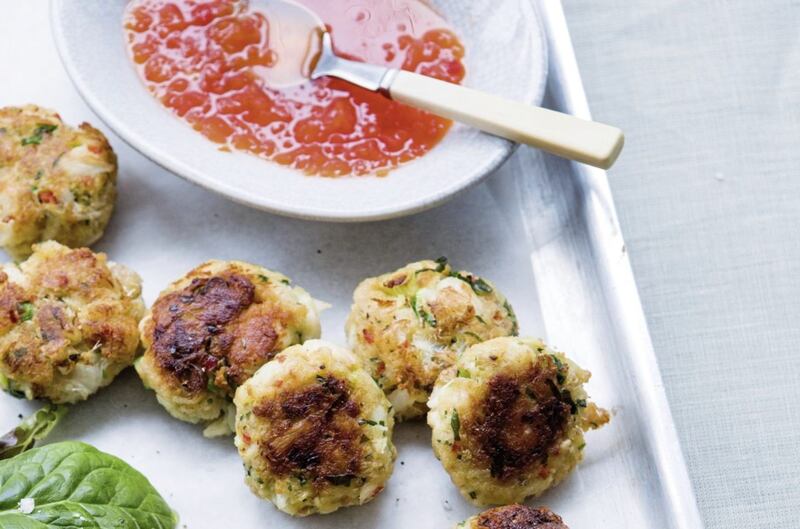
(Makes 12)
Tinned crab meat with large chunks of white meat make fantastic crab cakes. I have tried to make these with expensive fresh crab meat and I don’t think it gives the same result. You could also substitute the crab meat with tinned salmon or any firm white fish or even chicken. If using uncooked fish or chicken, pulse the meat in a food processor to a finely chopped texture.
25g butter
2 tbsp white wine
225g tinned crab meat
100g fresh white breadcrumbs
3 spring onions, chopped
2 garlic cloves, finely grated
1 red chilli, de-seeded and very finely chopped
½ egg, whisked
2 tbsp chopped fresh coriander, leaves and stalks
½ tbsp Dijon mustard
Coconut oil, for frying
Gently heat the butter and wine in a pan. Mix together all the other ingredients (except the coconut oil) in a large bowl. Add enough of the melted butter and wine to bring the mix together so that you can form it into cakes – you may not need all the butter and wine.
Form into 12 bite-sized crab cakes and chill for 30–40 minutes. Preheat the oven to 200C/180C fan/gas mark 6. Heat the coconut oil in a heavy-based pan set over a medium heat and gently fry the crab cakes until they are golden-brown on both sides. Transfer to a baking tray and cook in the oven for 10 minutes until cooked through.
